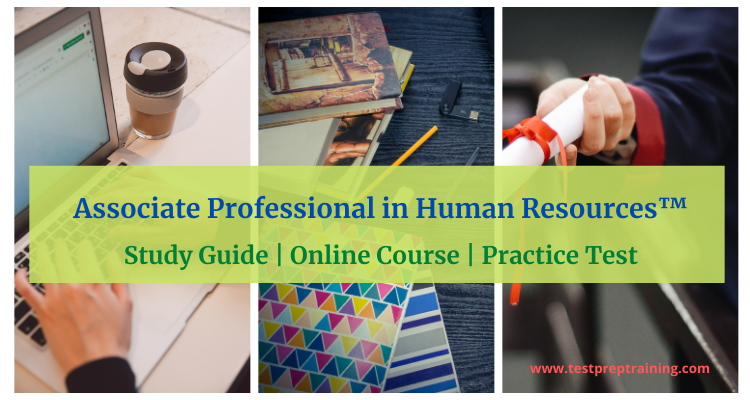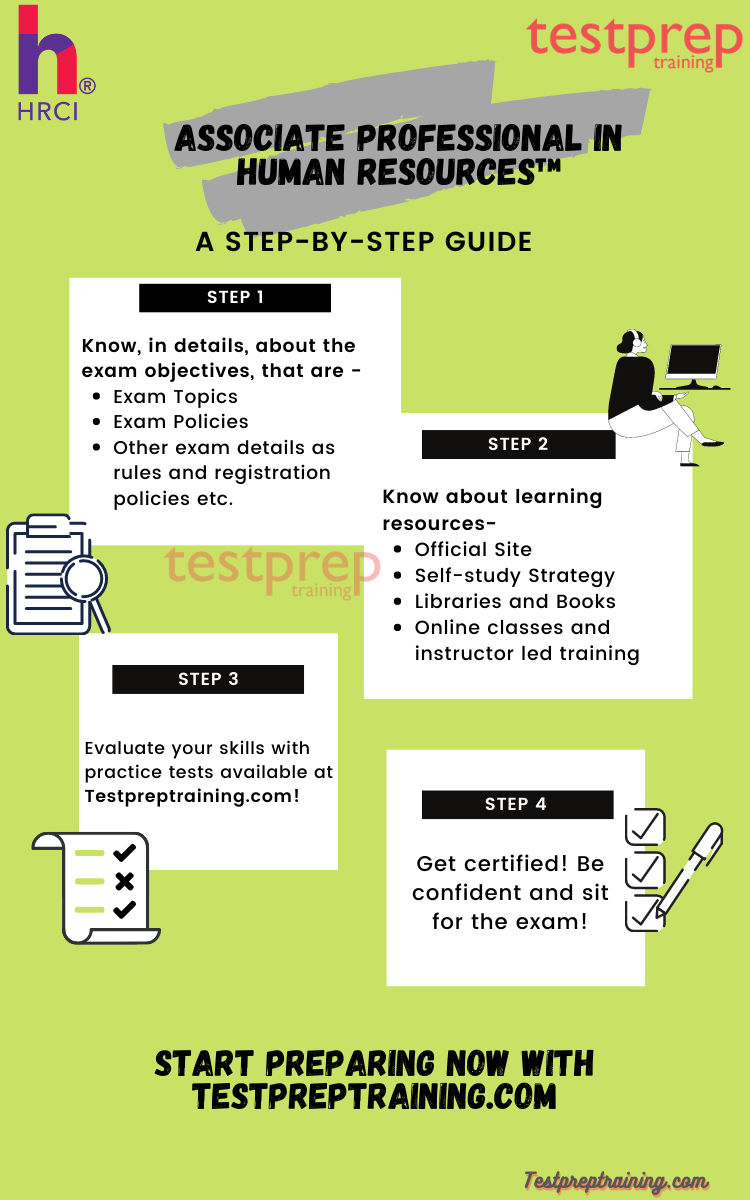Associate Professional in Human Resources™

Certifications helps you to shine bright and add value to your skill set and resume. HRCI Associate Professional in Human Resources™ (aPHR) certification helps candidates to fast-track their career growth and provides confidence to launch into the HR profession. Human Resource sector has been booming over the recent years and making a career in this sector can help making a lot of fortune. This kind of certifications are quite challenging as they help you in figuring the right direction for you. So, let us get into details of this valuable credential.
About Associate Professional in Human Resources™
HRCI Associate Professional in Human Resources (aPHR) certification helps candidates to fast-track their career growth and provides confidence to launch into the HR profession. The aPHR is the HR certification designed for professionals who are just beginning their HR career journey and proves your knowledge of foundational Human Resources.
Who should take the exam?
Candidates applying for the aPHR exam must have a high school diploma or global equivalent. No HR experience is required since this is a knowledge-based credential.
Exam Overview
| Exam Name Associate Professional in Human Resources | Exam Code aPHR |
| Exam Duration 2 hour 15 mins | Exam Format Multiple Choice |
| Exam type mostly multiple-choice + 25 pretest questions | Number of Questions 100 Scored questions + 25 pre-test questions |
| Certification Validity: 3 years | Exam Fee $300 USD + $100 USD Application fee |
| Exam Language English | Pass Score 500/700 |
HRCI HR Certifications – Exam Structure
HRCI exams include a variety of item types with various difficulty levels. Candidates must respond to all parts of an item correctly to receive credit for the item. No partial credit is awarded. To ensure items and exam forms are fair, all items are pretested (but not scored) in a live testing environment to make sure they meet HRCI’s quality standards. The passing score a candidate must achieve takes into consideration the various difficulty levels on the exam form.
Maintaining the certification
To maintain your aPHR certification, you must earn 45 recertification credits over a three-year time span or retake the exam.
Associate Professional in Human Resources™ FAQs

To know in detail about the exam you can pay a visit to the official site or visit – Associate Professional in Human Resources™ FAQs
Exam Content Outline
The exam will cover these topics for evaluation –

1. HR Operations (38%)
Understanding the tactical and operational tasks related to workforce management and the HR function. It also includes complying with the laws, regulations, and policies that affect the organization.
Knowledge of:
- Organizational strategy and its connection to mission, vision, values, business goals, and objectives
- Organizational culture (for example: traditions, unwritten procedures)
- Legal and regulatory environment
- Confidentiality and privacy rules that apply to employee records, company data, and individual data
- Business functions (for example: accounting, finance, operations, sales and marketing)
- HR policies and procedures (for example: ADA, EEO, progressive discipline)
- HR Metrics (for example: cost per hire, number of grievances)
- Impact of technology on HR (for example: social media, monitoring software, biometrics)
- Employee records management (for example: electronic/paper, retention, disposal)
- Statutory reporting requirements (for example: OSHA, ERISA, ACA)
- Purpose and function of Human Resources Information Systems (HRIS)
- Job classifications (for example: exempt, non-exempt, contractor)
- Job analysis methods and job descriptions
2. Recruitment and Selection (15%)
In this you will understand the hiring process including regulatory requirements, sourcing of applicants, formal interview and selection process, and onboarding of a new hire.
Knowledge of:
- Applicable laws and regulations related to recruitment and selection, such as non-discrimination, accommodation, and work authorization (for example: Title VII, ADA, EEOC Uniform Guidelines on Employee Selection Procedures, Immigration Reform and Control Act)
- Applicant databases
- Recruitment sources (for example: employee referral, social networking/social media)
- Recruitment methods (for example: advertising, job fairs)
- Alternative staffing practices (for example: recruitment process outsourcing, job sharing, phased retirement)
- Interviewing techniques (for example: behavioral, situational, panel)
- Post-offer activities (for example: drug-testing, background checks, medical exams)
- Orientation and onboarding
3. Compensation and Benefits (14%)
Understanding concepts related to total rewards such as pay and benefit programs. Responding to employee questions and handling claims in compliance with applicable laws, regulations, and company policies.
Knowledge of:
- Applicable laws and regulations related to compensation and benefits, such as monetary and nonmonetary entitlement, wage and hour, and privacy (for example: ERISA, COBRA, FLSA, USERRA, HIPAA, PPACA, tax treatment)
- Pay structures and programs (for example: variable, merit, bonus, incentives, non-cash compensation, pay scales/grades)
- Total rewards statements
- Benefit programs (for example: health care plans, flexible benefits, retirement plans, wellness programs)
- Payroll processes (for example: pay schedule, leave and time-off allowances)
- Uses for salary and benefits surveys
- Claims processing requirements (for example: workers’ compensation, disability benefits)
- Work-life balance practices (for example: flexibility of hours, telecommuting, sabbatical)
4. Human Resource Development and Retention (12%)
This will help you understanding the techniques and methods for delivering training programs and developing individual employees.
Knowledge of:
- Applicable laws and regulations related to training and development activities (for example: Title VII, ADA, Title 17 [Copyright law])
- Training delivery format (for example: virtual, classroom, on-the-job)
- Techniques to evaluate training programs (for example: participant surveys, pre- and post-testing, after action review)
- Career development practices (for example: succession planning, dual career ladders)
- Performance appraisal methods (for example: ranking, rating scales)
- Performance management practices (for example: setting goals, benchmarking, feedback)
5. Employee Relations (16%)
In this you will understand the methods organizations use to monitor and address morale, performance, and retention. It also includes balancing the operational need of the organization with comfort of the individual employee.
Knowledge of:
- Applicable laws affecting employment in union and nonunion environments, such as laws regarding antidiscrimination policies, sexual harassment, labor relations, and privacy (for example: WARN Act, Title VII, NLRA)
- Employee and employer rights and responsibilities (for example: employment-at-will, privacy, defamation, substance abuse)
- Methods and processes for collecting employee feedback (for example: employee attitude surveys, focus groups, exit interviews)
- Workplace behavior issues (for example: absenteeism, aggressive behavior, employee conflict, workplace harassment)
- Methods for investigating complaints or grievances
- Progressive discipline (for example: warnings, escalating corrective actions, termination)
- Off-boarding or termination activities
- Employee relations programs (for example: recognition, special events, diversity programs)
- Workforce reduction and restructuring terminology (for example: downsizing, mergers, out-placement practices)
6. Health, Safety, and Security (5%)
In this you will understand about the law, regulation, and policy that promote a safe work environment. Use risk mitigation procedures to protect against workplace hazards.
Knowledge of:
- Applicable laws and regulations related to workplace health, safety, security, and privacy (for example: OSHA, Drug-Free Workplace Act, ADA, HIPAA, Sarbanes-Oxley Act)
- Risk mitigation in the workplace (for example: emergency evacuation procedures, health and safety, risk management, violence, emergencies)
- Security risks in the workplace (for example: data, materials, or equipment theft, equipment damage or destruction, cyber crimes, password usage)
Preparatory Guide for Associate Professional in Human Resources™
There are unlimited resources available for preparation which are available for the prescribed syllabus. Out of the many resources you can choose as many as you feel comfortable with. Always remember that the resources that you will choose will make the difference. Clearing the exam will be easier if you choose the right set of resources. Let us have a look at some of the resources –

Resource 1: Online Trainings
There are many online sites that provide with the online trainings and instructor-led trainings. These programs are interactive enough and help in clearing the doubts in a very nice manner. The official site provides customized bundles for the exam. Some sites also provide every time doubt clearing service which helps you in clearing your doubts instantly.
Resource 2: Associate Professional in Human Resources™ Books
You can refer to any book that you are familiar with and that suits best to your level of understanding. We all are familiar with the importance of books and how efficient they are. They not only help you understand the concept better but also makes your basics clear. You can also refer these books –
- Human Resource Management In Practices
- The Practical Guide To HR Analytics
Resource 3: The Official Site
The official site provides relevant information on various technicalities of the exam. You can find all the details of the exam along with the resources that are made available by the official site. You can also read the blogs that are made available by the site or people those have cleared the exam. Make sure to visit the official site for the updates of the exam and for every detail of the exam. HRCI being a responsible vendor has produced a series of sample papers that the candidates can use to help prepare for the exam.
Resource 4: Practice Tests
Practice papers and test series are a way to determine the level of your preparation. They will help you identify weak parts of your preparation and will decrease the silly mistakes. Practicing is the key to qualifying any certification exam and Associate Professional in Human Resources™ is no different. So, make sure to practice as much as you can. If you wish to strengthen your preparation process as well as boost your confidence, then you must try practice tests. Try a free practice test now!

